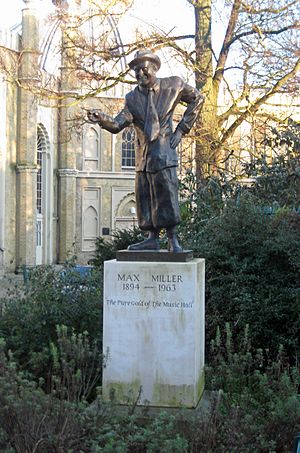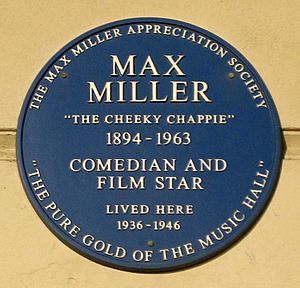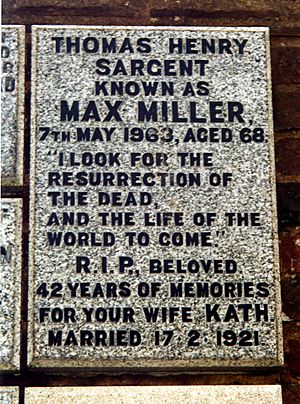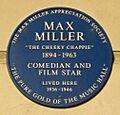Max Miller (comedian) facts for kids
Quick facts for kids Max Miller |
|
|---|---|

Bronze statue of Miller at the
Pavilion Gardens, Brighton |
|
| Birth name | Thomas Henry Sargent |
| Born | 21 November 1894 Hereford Street, Kemptown, Brighton, East Sussex, England |
| Died | 7 May 1963 (aged 68) 25 Burlington Street, Brighton, East Sussex, England |
| Resting place | Downs Crematorium, Brighton, East Sussex, England |
| Genres | Blue comedy |
| Spouse | Frances Kathleen Marsh |
Thomas Henry Sargent (born November 21, 1894 – died May 7, 1963) was an English comedian. He was known by his stage name Max Miller and often called The Cheeky Chappie. Many people thought he was the best stand-up comedian of his time.
Max Miller came from a poor background and left school when he was 12. He joined the army during World War I. While in the army, he started a group that put on shows for soldiers. After the war, he became a comedian, dancer, and singer. He traveled a lot, performing in different shows. By the early 1930s, he was a top star in big music halls, like the famous London Palladium.
He recorded many songs, and he even wrote some of them himself. He was often on the radio. However, television did not really suit his style of comedy. He also appeared in 14 movies. Max Miller was famous for his bright, fancy suits, his charming personality, and his jokes. These jokes sometimes got him into trouble with people who checked for inappropriate content. He made his last recording in January 1963 and passed away four months later.
Contents
Biography
Early life and the war
Max Miller was born as Thomas Henry Sargent on November 21, 1894. His birthplace was Hereford Street in Kemptown, Brighton, Sussex. He was the second child of James Sargent, who was a laborer, and Alice West, who sold flowers. Max had three brothers and two sisters.
His family was poor and often had trouble paying rent. Because of this, they had to move to different parts of town many times. Max changed schools often until he left completely at age 12. He tried various jobs, such as a laborer, milk delivery person, and fish and chips seller. He also worked as a caddy at a golf course. Finally, he trained to be a motor mechanic. When he was young, people called him "Swanky Sargent."
When World War I started in 1914, Max volunteered for the army. He joined the Royal Sussex Regiment. He served in France, then in India, and later in Mesopotamia. In Mesopotamia, he was temporarily blinded for three days. This experience stayed with him. In his later life, he did a lot to help people who were blind. While in the army, he started a "concert party" to entertain the troops.
Starting his career in show business
After leaving the army, it was hard for Max to find work. His mother had died from the 1918 flu pandemic. He wanted to perform in London and got a show booked at the Shoreditch Hall in 1919. He wasn't experienced enough for such a big place and only performed for one week.
He went back to Brighton and saw an advertisement for performers. It was for Jack Sheppard's concert party, which performed outdoors on Brighton beach. Max applied and joined as a light comedian for the summer of 1919. While working there, he met his future wife, Frances Kathleen Marsh. She was a singer in the same group.
Kathleen Marsh came from a middle-class family. Her parents moved to Brighton from Dorset shortly before she was born in 1896. Her older brother, Ernest Marsh, was a local politician in Brighton for 43 years. He even became the mayor of the town from 1949 to 1950.
In the summer of 1920, Max toured across the country in a concert party called The Rogues. The next year, Max and Kathleen toured together in a show called The Girl. They got married in Plymouth, Devon, on February 17, 1921. Kathleen was not only a performer but also a smart businesswoman. She helped Max's career a lot. She suggested he change his name to Max Miller. Later, a newspaper called Max "the Cheeky Chappie," and the nickname stuck.
Max and Kathleen performed as a duo for a while. But Kathleen soon realized that Max was the stronger performer. She thought he would do better as a solo act.
On the road to stardom
Throughout the 1920s, Max regularly toured in different shows. He performed in There You Are Then (1922), The Ernest Binn Arcadians (1923), and Crisps (1924). During the summer of 1924, he returned to Jack Sheppard's Concert Party in Brighton. In 1925, he continued with Crisps and then joined Ten to One On, which starred Jimmy James. This show ran until February 1926.
After that, he started working in variety shows. These were often "cine-variety" shows, which were half film and half live acts. In September, he performed at the Holborn Empire for the first time. There, a famous show producer named Tom Arnold saw him. Arnold hired Max to star in his next show, Piccadilly. This show opened in Birmingham and toured the country. His co-star was Florence Desmond, who was 21 years old.
After Piccadilly, Max worked for Fred Karno in The Show. In May, he joined a touring cabaret show called XYZ until the end of the year. After a few weeks in variety, he starred in Francis Laider's Tipperary Tim. This kept him busy until February 1929. At this point, he got a new agent, Julius Darewski. This was a very important step in his career.
In May, he performed for the first time at the famous London Palladium. He returned there in October. In November, he joined the cast of Fools in Paradise, which ran until March 1930. This was his last big show for some time.
Max Miller preferred to perform by himself. From 1930 onwards, he appeared in variety shows in many large theaters. These included the London Palladium and the Holborn Empire. Back then, performers had to work hard for a long time to become famous. In May 1931, he performed in his first Royal Variety Performance. Soon after, he started broadcasting on the radio.
In 1932, he made his first recording, Confessions of a Cheeky Chappie. After this first success, he signed with HMV and made many records for them. In 1953, he switched to Philips and then to Pye.
Max Miller had a small role in the 1933 film The Good Companions. He played a music publisher selling a song. Even though he wasn't officially credited, his three-minute appearance was impressive. It helped him get noticed and led to him making 13 more films. He started with small parts and eventually got starring roles. His best film, Educated Evans (1936), is now lost. His second-to-last film was Hoots Mon! (1940). In this movie, he played a comedian named Harry Hawkins. There's a scene where Harry Hawkins performs on stage. This scene is the only one that shows what Max Miller's stage act was like. It is always included in any documentary made about him.
Becoming a star
Max Miller's act in a variety show usually lasted between 20 and 30 minutes. It would start with the orchestra playing his special song, Mary from the Dairy. A bright light would shine on the curtain where he was about to appear. The audience would get excited. Sometimes, he would wait for up to 10 seconds before coming out, which made the applause even louder. He would walk to the microphone and just stand there in his costume. He wore very colorful suits with plus-fours (baggy trousers), a wide tie, a trilby hat, and two-toned shoes. He would wait for the laughter to begin.
His show included songs, both sentimental ones like My Old Mum and funny ones like Twin Sisters. Sometimes he would play the guitar or do a soft shoe tap dance. He wrote or helped write many of his songs.
He was very much a comedian from southern England. He preferred to perform in theaters in London or the south. This way, he could return to his beloved Brighton after a show. But in 1932, he went on his only tour outside the UK. He sailed to Cape Town to perform in Johannesburg and Pretoria, South Africa.
After several years as a solo act, he appeared in George Black's wartime show Haw Haw! at the Holborn Empire. This was from December 1939 to July 1940. George Black's next show, Apple Sauce, opened in August 1940 at the Holborn Empire. Max co-starred with Vera Lynn. After the theater was bombed, the show moved to the London Palladium. It ran there until November 1941. After that, Max was back touring in variety shows. He broke all records as the highest-paid variety artist. In February 1943, he earned £1,025 in one week at the Coventry Hippodrome.
In 1947, he was the main act in Bernard Delfont presents International Variety at the London Casino. A theater critic from the Daily Mail newspaper, Lionel Hale, called Miller the "Gold of the music hall."
The comeback
Max Miller performed in three Royal Variety Performances (in 1931, 1937, and 1950). In the last one, he was upset because he was only given six minutes to perform. The American comedian Jack Benny got 20 minutes. So, Max decided to ignore his script and performed for 12 minutes. He ended with huge applause, but this messed up the show's schedule.
Val Parnell, the show's producer, was very angry. He told Max that he would never work for him again. However, after 18 months of Max performing in smaller theaters, he was invited back to the main theaters. He returned in triumph to the London Palladium. This helped his career a lot. He got a new recording contract with Philips. He was back on the radio and appeared on television. However, his television appearances were not very successful. The new medium did not suit his style. He needed the reactions from a live audience. He also needed the freedom to use his slightly naughty jokes.
Max Miller regularly performed in all the big variety halls in and around London. These included the Hackney Empire, Chelsea Palace, Chiswick Empire, Finsbury Park Empire, Wood Green Empire, and Metropolitan Music Hall. It was at the Metropolitan Music Hall that he recorded the LP record, Max at the Met, in 1957.
The final years
In 1958, Max Miller had a heart attack. After he recovered, he needed to take life easier. His last performance in London's West End was at the Palace Theatre in April 1959. His very last variety show was in Folkestone in December 1960.
He continued to make records. His last one was in January 1963 with Lonnie Donegan. Max Miller passed away on May 7, 1963, at his home. He was cremated at the Downs Crematorium in Brighton. A special tablet in his memory is on a wall in the Garden of Remembrance there. His wife Kathleen lived nine years longer than him. She died in a nursing home in Hove in 1972.
As television became more popular, there was less work for variety performers. Max Miller once said, "When I'm dead and gone, the game's finished."
Some people have suggested that the character Archie Rice in John Osborne's play The Entertainer was based on Max Miller. However, John Osborne said this was not true. In his autobiography, he wrote that "Archie was a man. Max was a god."
Legacy
Max Miller influenced many comedians during his life and even after. His jokes are still told by other comedians today. The late comedian Walter William Bygraves became known as "Max Bygraves" because he imitated Miller. Max Miller was also one of the many famous people shown on the cover of the Beatles' album "Sgt. Pepper's Lonely Hearts Club Band".
A book about Max Miller called Max Miller the Cheeky Chappie by John M. East was published in 1977. Later, a paperback version came out in 1993 with more information. Two paperback books with Miller's jokes have also been published. These are The Max Miller Blue Book (1975) and The Max Miller Appreciation Society's Blue Book (2001).
Several radio and television documentaries have been made about him. These include The Girls Who Do (1989) and Heroes of Comedy: Max Miller (1995). A play about him called Here's a Funny Thing was shown at the Edinburgh Fringe and in London. It was also broadcast on Channel 4 in November 1982.
In 1999, the Max Miller Appreciation Society was started in Brighton. Its main goal is to keep his memory alive. The society put up a bronze statue of him in the Royal Pavilion Gardens in Brighton (unveiled in 2005). They also placed two blue plaques on his former homes. One is in Kingston Lane, Shoreham-by-Sea (2000), and the other is at 160 Marine Parade, Brighton (2006). In 2009, the Society organized an exhibition about Miller's life and career.
Catchphrases
He was famous for using these phrases during his shows:
- "Now, there's a funny thing"
- "Listen! Listen!"
- "There'll never be another"
- "They don't make 'em anymore, duck!"
- "It's people like you who give me a bad name"
- "It's all clever stuff, no rubbish!"
- "How's your memory, gal?"
- "Miller's the name, Lady"
- "I don't care what I say, do I?"
- "That's nice, Maxie"
- "You can't help liking him"
- " 'Ere!"
Filmography
|
|
Images for kids
See also
 In Spanish: Max Miller (humorista) para niños
In Spanish: Max Miller (humorista) para niños
 | Charles R. Drew |
 | Benjamin Banneker |
 | Jane C. Wright |
 | Roger Arliner Young |






